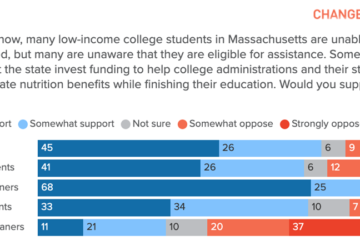Guest Author: Project Bread (original post)
As students plan for classes, Project Bread and The Massachusetts Hunger-Free Campus Initiative wants to ensure they have the nutrition they need to graduate and succeed.
The Numbers
Many college students experience food insecurity
Back to school season is almost upon us, and thousands of college students across the Commonwealth are planning their classes. Hunger isn’t a topic often associated with discussions of going to college, and yet the numbers are startling:
- 37% of public university students in Massachusetts experience food insecurity.
- Groups that already experience systemic discrimination based on race, gender, and/or sexuality are also disproportionately affected by food insecurity:
- 52% of Black public university students in Massachusetts experience food insecurity.
- 47% of Latinx public university students in Massachusetts experience food insecurity.
- 46% of LGBTQIA+ public university students in Massachusetts experience food insecurity, and of course many are also Black and/or Latinx.
- 53% of student parents are likewise disproportionately affected by food insecurity.
The Challenge
Colleges don’t have the capacity or resources to solve hunger on campus
Tackling the hunger problem on campuses is especially important right now, as many students and their families are still struggling with the financial and health effects of COVID. These have resulted in an increasing number of students facing food insecurity, adding to numbers that were already unacceptable even pre-pandemic.

Unfortunately, colleges and universities simply don’t have the capacity or the resources to adequately address hunger among their students. Indeed, before COVID community colleges across Massachusetts had already been watching enrollment decline and expenses rise. According to WBUR, “enrollment crashed to a 23-year low in the fall of 2020, and the early data suggest that next fall could be even worse.” The same article also notes that many people are not applying to college, or returning, because, among other things, they’re currently struggling with food insecurity and so need to work full time.
The Solution
An Act establishing the Massachusetts Hunger-Free Campus Initiative
If colleges and universities are to fulfill their purpose, to graduate students who are prepared for success in whatever future endeavor they choose, we must address hunger on campus, especially hunger among those disproportionately affected students from marginalized communities.
Enter the Massachusetts Hunger-Free Campus Coalition, of which Project Bread is a proud member! The coalition has filed legislation to tackle campus hunger. Called An Act establishing the Massachusetts Hunger-Free Campus Initiative (Senate Bill 822 and House Bill 1368), the bill is sponsored by Senator Harriette Chandler, Representative Andy Vargas, and Representative Mindy Domb. The legislation provides for systemic change by targeting and coordinating resources so that Massachusetts colleges and universities can help all their students complete college by expanding successful anti-hunger initiatives on their campuses.
The Details
Building capacity and providing resources to solve campus hunger
The bill aims to build capacity and resources through establishing an Office of Capacity Building in the Department of Higher Education (DHE) that will work with institutions to implement anti-hunger initiatives, and once these are implemented, the institution will be designated as a Hunger-Free Campus.
An Act establishing the Massachusetts Hunger-Free Campus Initiative would look something like this:
- The DHE establishes the Hunger-Free Campus Initiative, which will be available to all public higher education institutions and certain not-for-profit campuses that disproportionately serve low-income students.
- The DHE will establish an Office of Capacity Building services to support public higher education institutions in understanding and addressing existing gaps in addressing food insecurity.
- The Office of Capacity Building will work with institutions to implement the following anti-hunger initiatives, and once these are implemented, the institution will be designated as a Hunger-Free Campus:
- Designate a college staff person to be the point of contact for the office.
- Establish a hunger-free campus taskforce.
- Notify students who receive need-based financial aid of their potential eligibility to receive SNAP (Supplemental Nutrition Assistance Program), WIC (The Special Supplemental Nutrition Program for Women, Infants, and Children), and other federal and state nutrition benefits.
- Host or participate in at least one hunger awareness event per year.
- Assess the need for on-campus food distribution, access to an off-campus food pantry, or an on-campus food pantry.
The Action
You can take action right now to help make college hunger-free!
Passage of An Act establishing the Massachusetts Hunger-Free Campus Initiative would be a game changer for students and families across the state. As students get ready to work hard this coming semester, you can lend them your support and use Project Bread’s easy template to email your legislators about this bill and other priority anti-hunger legislation.
Let’s make sure that Massachusetts is doing everything it can to help those attending college within its borders to graduate and succeed!
Getting SNAP
Help for College Students
SNAP is a federal nutrition program (formerly known as food stamps) that provides eligible residents with monthly financial assistance to purchase groceries. Special SNAP eligibility rules apply to college students.
Learn more about SNAP eligibility for college students at GettingSNAP.org. Use the Live Chat feature on the website to talk to a Project Bread counselor online or call Project Bread’s FoodSource Hotline at 1.800.645.8333.
